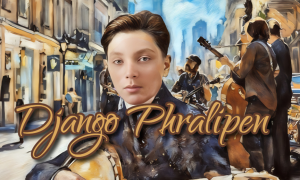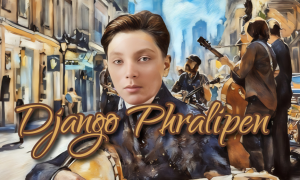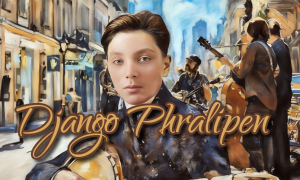Home » Jazz Articles » Django's Cosmic Echo » Chapter Sixteen: Ghosts of Ipanema
Chapter Sixteen: Ghosts of Ipanema
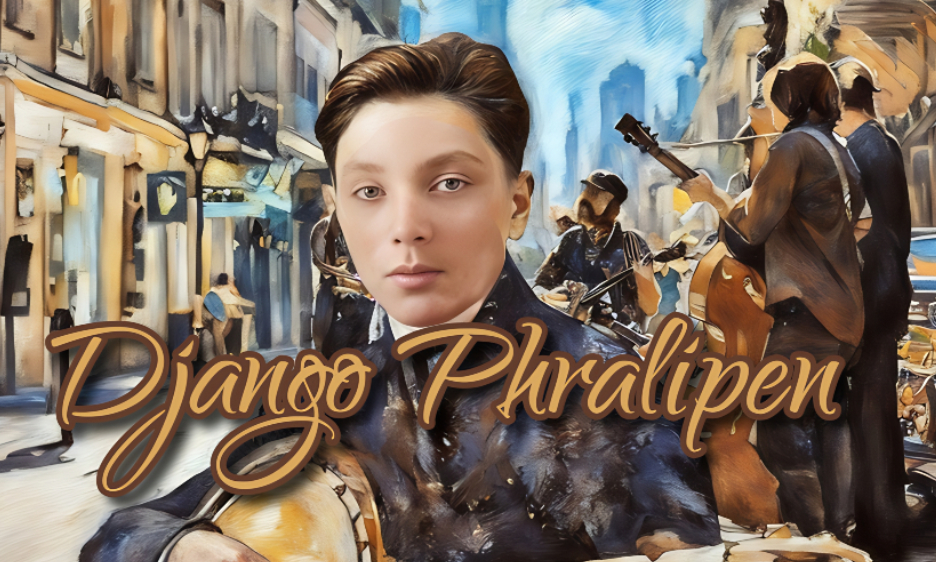
Courtesy AI
Chapters
1 | 2 | 3 | 4 | 5 | 6 | 7 | 8 | 9 | 10 | 11 | 12 | 13 | 14 | 15 | 16 | 17 | 18The year was 1973. Five years had passed since the Kumpania tour had, against all odds, blazed a trail across the American Northeast, five years since Lenny Kramer's Rolling Stone feature had catapulted the Django Phralipen Brotherhood from an underground sensation to an international phenomenon. More albums followed, each a testament to their evolving, fiery sound. Paradiso Fire had even snared a surprise Grammy.
But even the most incandescent brotherhoods can run their course. Django's own artistic spirit, ever restless, yearned for new landscapes, fresh collaborations. The dissolution, when it came, was amicable, born not of discord but of diverging paths and Django's insatiable hunger for new musical conversations. Bobbi Holloway, her flute a golden voice, had soared into a stellar solo career, occasionally their orbits intersecting for breathtaking guest appearances. Dave, Marc, Leo, Rico, and Anya, financially secure and creatively fulfilled, had found their own new ventures. Dirk Bakker, ever the pragmatic anchor, remained Django's manager, guiding his solo career with the same steady hand that had navigated their early, improbable rise.
Now, Django Phralipen was a name whispered with reverence in jazz clubs and concert halls from Tokyo to Berlin. His music, a potent alchemy of Romani soul, sophisticated jazz, raw funk, and an indefinable pop sensibility, resonated globally. Yet, beneath the veneer of the celebrated artist, the man who charmed audiences with his dazzling virtuosity and quiet charisma, the secret of his past life remained a constant, aching weight. He had never returned to France. The very thought conjured a maelstrom of emotions too perilous to navigate.
Rio de Janeiro shimmered under a late afternoon sun, the iconic curve of Ipanema beach a ribbon of gold against the turquoise Atlantic. Django, in the city for a series of sold-out concerts at the Teatro Municipal, sat in a quiet, shaded corner of the hotel's exclusive terrace bar, a cup of strong Brazilian coffee before him. He was quiet and reflective, lost in thought, taking in the magic unveiled before him in the breathtaking vista of the bay and the vibrant energy of the city. He looked up as a small party entered the terrace.

Stephane Grappelli
violin1908 - 1997
Older, certainly, the lines on his face etched deeper by time and travel, but unmistakably him. The Maestro, holding his violin case, was accompanied by a younger man and a woman, likely his tour manager or companions. Django's heart hammered against his ribs, a sudden, painful lurch that transcended the years. He was aware, of course, that Grappelli still toured, a living legend gracing the world's stages. He also knew Grappelli would be aware of him, a Grammy-winning guitarist with the shared, resonant first name.
The desire to speak to him, to bridge the impossible chasm of his hidden life, was an overwhelming, physical ache. He rose, composing himself, and crossed the terrace.
"Maestro Grappelli?" Django's voice (now speaking French) was low, steady. "Forgive my intrusion. My name is Django Phralipen. I am... a profound admirer."
Grappelli turned. Recognition of the famous name flickered in his eyes. He had, of course, heard of this young Django, the one making waves with his explosive, five-fingered technique. He'd even listened to his records, noting the unusual fire, the undeniable talent. "Ah, Monsieur Phralipen," Grappelli said, his tone courteous, extending a hand. "A pleasure. I've heard your music, of course. Quite... impactful."
But as Django Phralipen met his gaze and spoke again, a deeper, more unsettling sensation rippled through Grappelli. The voice... the accent, there was a timbre, a particular cadence, that struck a chord buried deep within his memory, disturbingly familiar. And the face—this young man bore an almost impossible, spectral resemblance to the Django Reinhardt. It was the same fiery intensity in the dark eyes, the same subtle curve of the smile, the very essence of the youthful genius he had known.
But then Grappelli's gaze, as it always did with guitarists, flickered to the man's hands. And here, the world tilted. Django Phralipen's hands were whole, agile, unmarred. Two perfectly formed hands. The Django Reinhardt Grappelli had known, from their very first meeting, had borne the terrible scars of the caravan fire, his genius forged in defiance of his maimed left hand. This vision before him—a young Django, around the age he was when their stars first aligned, yet impossibly uninjured—was profoundly disorienting. It was like staring at a ghost from an unlived past, a vibrant "what if" made flesh. This wasn't just a namesake; this was an unnerving, almost sacrilegious echo of his dearest friend, but from a time before the tragedy that had defined him. "Your work with Django Reinhardt... it has been a lifelong inspiration for me," Django continued, the familiar resonance of his voice, coupled with the impossible sight of those healthy hands, sending a profound shiver of almost fearful recognition down Grappelli's spine. The Maestro's polite smile became fixed, his eyes now wide with a dawning, bewildered intensity.
"You knew him better than anyone," Django pressed gently, his gaze unwavering. "What was he truly like, beyond the legend that has grown around him?"
The question, delivered in that hauntingly familiar voice by a young man who was an almost spectral echo of his past, struck Grappelli with palpable force. The uncanny physical resemblance, the voice, the name, and now this intimate inquiry about his dearest friend—it was all utterly discombobulating, shaking the very foundations of his memory. He drew a slow, unsteady breath, his mind struggling to process the impossible scene.
"My Django... " Grappelli finally managed, his voice hushed, almost reverent, his eyes still fixed on Phralipen with a bewildered, searching intensity. "Yes... he was a force of nature. A true genius." He paused, then added softly, as if grappling with the vision before him, "And you, Monsieur Phralipen... you speak of him with... great understanding."
A comfortable silence settled for a moment, charged with unspoken thoughts. Then Django Phralipen leaned forward slightly. "Maestro, I am playing at the Teatro Municipal tonight. It would be the greatest honor of my life if you would consider... being my guest on stage for a number or two."
Grappelli was taken aback. The invitation, coming from this unsettlingly familiar figure, felt loaded, freighted with an unspoken significance that went beyond a simple professional courtesy. His musician's curiosity, always a potent force, warred with the deep unease that had been steadily growing within him.
"Young man," Grappelli said slowly, "that is... a most generous offer. What did you have in mind?" Django met his searching gaze. "Perhaps... 'Nuages'? Or 'Minor Swing'? A melody you both gave to the world, Maestro."
Grappelli hesitated, the proposal almost surreal. The thought of playing those iconic tunes, tunes so deeply intertwined with his Django, with this Django Phralipen... it was a compelling, almost irresistible, yet profoundly perplexing prospect. A need to understand this enigma, to hear what the music itself might reveal, began to outweigh his trepidation. A faint, almost challenging spark flickered in his aging eyes.
"Nuages," he said, his voice firming. "Yes. Let us see what the music says tonight." He agreed, a complex whirlwind of emotions already churning within him, the ghosts of Ipanema seeming to swirl with the afternoon breeze.
Story by Alan Bryson, edited and assisted by AI.
Disclaimer: This is a fictional account exploring what might have happened if a temporal quantum event had occurred. While real musicians and historical figures appear within these pages, they exist here in an alternate timeline—a reality that quantum theory suggests was possible, but that never came to pass. All interactions, conversations, and events involving these individuals are entirely fictional, products of a world that exists only in the space between what was and what might have been.
Tags
Comments
PREVIOUS / NEXT
Support All About Jazz
 All About Jazz has been a pillar of jazz since 1995, championing it as an art form and, more importantly, supporting the musicians who make it. Our enduring commitment has made "AAJ" one of the most culturally important websites of its kind, read by hundreds of thousands of fans, musicians and industry figures every month.
All About Jazz has been a pillar of jazz since 1995, championing it as an art form and, more importantly, supporting the musicians who make it. Our enduring commitment has made "AAJ" one of the most culturally important websites of its kind, read by hundreds of thousands of fans, musicians and industry figures every month.




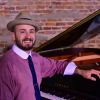



 Buy Now
Buy Now




